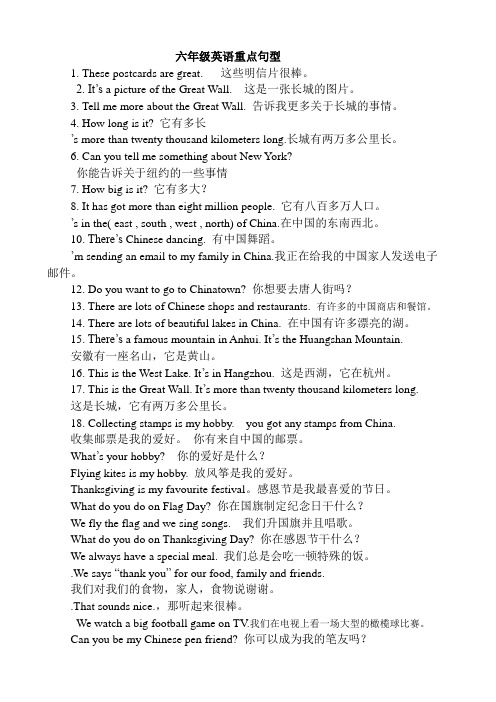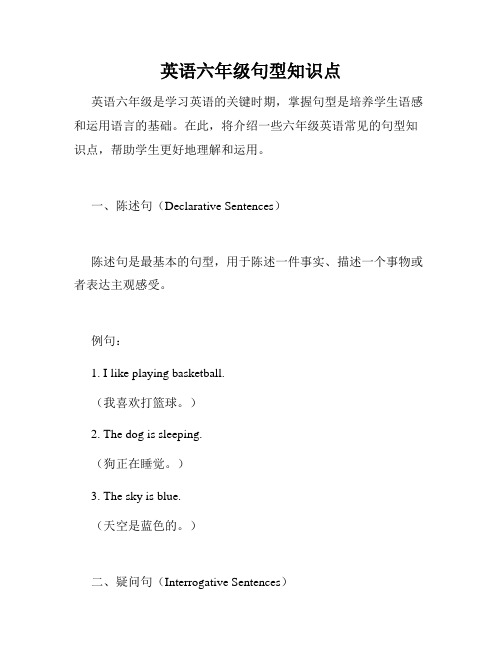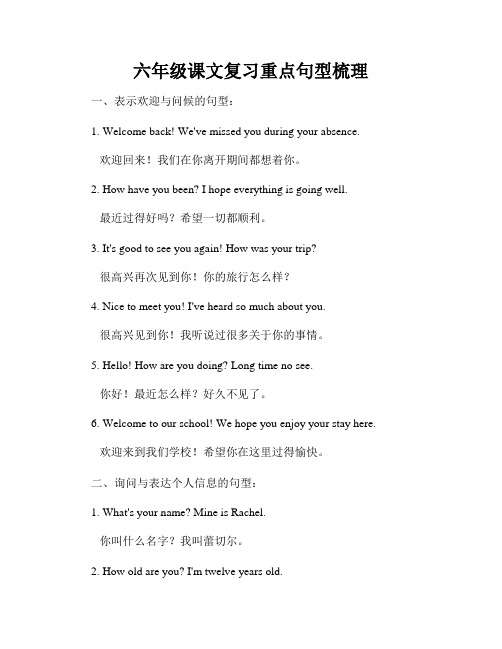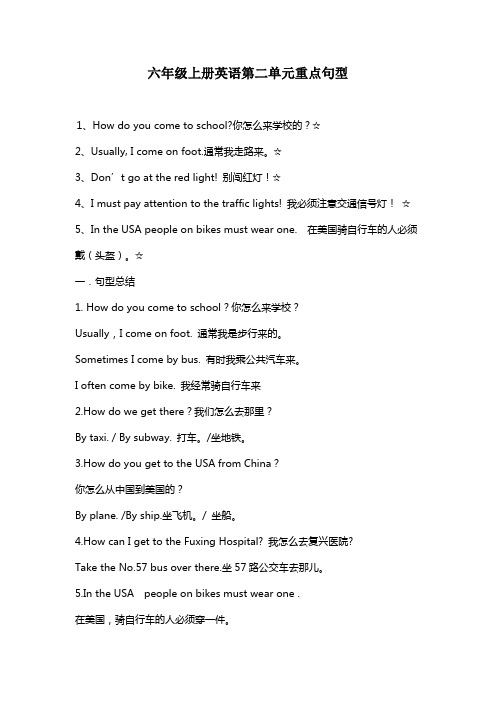英语六年级句型总结
六年级英语重点句型

六年级英语重点句型1. These postcards are great. 这些明信片很棒。
2. It’s a picture of the Great Wall. 这是一张长城的图片。
3. Tell me more about the Great Wall. 告诉我更多关于长城的事情。
4. How long is it? 它有多长’s more than twenty thousand kilometers long.长城有两万多公里长。
6. Can you tell me something about New York?你能告诉关于纽约的一些事情7. How big is it? 它有多大?8. It has got more than eight million people. 它有八百多万人口。
’s in the( east , south , west , north) of China.在中国的东南西北。
10. There’s Chinese dancing. 有中国舞蹈。
’m sending an email to my family in China.我正在给我的中国家人发送电子邮件。
12. Do you want to go to Chinatown? 你想要去唐人街吗?13. There are lots of Chinese shops and restaurants. 有许多的中国商店和餐馆。
14. There are lots of beautiful lakes in China. 在中国有许多漂亮的湖。
15. There’s a famous mountain in Anhui. It’s the Huangshan Mountain.安徽有一座名山,它是黄山。
16. This is the West Lake. It’s in Hangzhou. 这是西湖,它在杭州。
六年级上册英语句型结构大全

六年级上册英语句型结构大全一、陈述句结构陈述句是用来陈述事实或观点的句子,通常以动词或动词短语作为谓语,并以降序的方式结束。
例如:I like apples. (我喜欢苹果。
)陈述句有时也可以省略主语和谓语,但仍能表达完整的意思。
例如:The sun rises in the east. (太阳从东方升起。
)二、疑问句类型疑问句是用来提出问题的句子,它的语序与陈述句不同,通常是将疑问词放在句首,并使用升调。
疑问句可以分为以下几种类型:1. 一般疑问句:以疑问词开头,后面跟简单动词和主语。
例如:Is she your sister? (她是你妹妹吗?)2. 特殊疑问句:以疑问词开头,后面跟不完全及物动词、宾语和主语。
例如:What time does the train leave? (火车什么时候开?)3. 选择疑问句:提出两个或两个以上的可能性,供对方选择。
例如:Do you want coffee or tea? (你要咖啡还是茶?)4. 反意疑问句:前面是肯定的句子,后面用否定形式提问;前面是否定的句子,后面用肯定形式提问。
例如:He likes apples, doesn’t he? (他喜欢苹果,对吗?)三、否定句表达否定句是用来表示否定意义的句子,通常是在谓语前加上否定词或使用否定形式的谓语。
否定句可以分为以下几种类型:1. 简单否定句:在谓语前加上否定词,如“not”、“no”等。
例如:She is not a teacher. (她不是老师。
)2. 双重否定句:使用两个否定词来表示肯定意思。
例如:I cannot help but admire him. (我不得不佩服他。
)3. 强调否定句:通过强调结构来加强否定语气。
例如:I do not believe you. (我才不信你呢。
)4. 否定转移句:将否定词转移到从句中。
例如:He said he didn’t know her. (他说他并不认识她。
英语六年级句型知识点

英语六年级句型知识点英语六年级是学习英语的关键时期,掌握句型是培养学生语感和运用语言的基础。
在此,将介绍一些六年级英语常见的句型知识点,帮助学生更好地理解和运用。
一、陈述句(Declarative Sentences)陈述句是最基本的句型,用于陈述一件事实、描述一个事物或者表达主观感受。
例句:1. I like playing basketball.(我喜欢打篮球。
)2. The dog is sleeping.(狗正在睡觉。
)3. The sky is blue.(天空是蓝色的。
)二、疑问句(Interrogative Sentences)疑问句用于提问,可以询问事实、方式、理由等信息。
疑问句一般以疑问词(who, what, when, where, why, how)开头。
例句:1. What is your favorite color?(你最喜欢的颜色是什么?)2. Where are you going?(你要去哪里?)3. How do you go to school?(你怎样去学校?)三、祈使句(Imperative Sentences)祈使句通常用于表达请求、命令、建议等。
动词原形单独构成祈使句,可以在句首加上助动词或者“let’s”来表示委婉或者提出建议。
例句:1. Please clean your room.(请打扫你的房间。
)2. Stop talking and listen to the teacher.(停止说话,听老师讲。
)3. Let's play soccer together.(我们一起踢足球吧。
)四、感叹句(Exclamatory Sentences)感叹句用于表达惊讶、高兴、悲伤等强烈的感情。
例句:1. What a beautiful flower!(多么美丽的花啊!)2. How delicious the cake is!(蛋糕多好吃啊!)3. What a hot day it is!(多么炎热的一天啊!)五、条件句(Conditional Sentences)条件句用于表达某种条件下的假设或者可能性,由“if”引导。
六年级课文复习重点句型梳理

六年级课文复习重点句型梳理一、表示欢迎与问候的句型:1. Welcome back! We've missed you during your absence.欢迎回来!我们在你离开期间都想着你。
2. How have you been? I hope everything is going well.最近过得好吗?希望一切都顺利。
3. It's good to see you again! How was your trip?很高兴再次见到你!你的旅行怎么样?4. Nice to meet you! I've heard so much about you.很高兴见到你!我听说过很多关于你的事情。
5. Hello! How are you doing? Long time no see.你好!最近怎么样?好久不见了。
6. Welcome to our school! We hope you enjoy your stay here.欢迎来到我们学校!希望你在这里过得愉快。
二、询问与表达个人信息的句型:1. What's your name? Mine is Rachel.你叫什么名字?我叫蕾切尔。
2. How old are you? I'm twelve years old.你几岁了?我12岁。
3. Are you a student? Yes, I am. I go to Westwood Elementary School.你是学生吗?是的,我是。
我在西木小学上学。
4. Where do you live? I live in the Green Meadows neighborhood.你住在哪里?我住在绿草地社区。
5. Do you have any hobbies? Yes, I enjoy playing soccer and painting.你有什么爱好吗?是的,我喜欢踢足球和画画。
小学六年级毕业英语句型总结

句型总结一、社会交往(一)问候1.A: Hello ! Hi!B: Hello ! Hi!2.A: Good morning!/Good afternoon!/ Good evening !B: Good morning!/Good afternoon! / Good evening ! 3.A: How are you !B: I’m OK .Fine , thanks, and you?Very well , thank you .4.A: How do you do?B: How do you do ?(二)介绍1. A: I’m Bill . What’s your name ?B: My name is Jim./ I’m Jim .2. A: Who’s he / she ?B: He / She is … .3. A: Where are you from ? / Where do you come from ?B: I’m from…./ I come from … .4. A: Where do you live ?B: I live in ….5.A: This is Mr./ Mrs. / Miss Brown.B: Nice to meet(see)you ./Glad to meet(see)you.(三) 告别1.A: Good-bye./ Bye-bye./ Bye.B: Good-bye./ Bye-bye./ Bye.2.A: Good night.B: Good night.3.A: See you tomorrow./See you.B: See you tomorrow./See you.(四) 感谢1. A: Thank you./ Thanks./ Thank you very much .B: You’re welcome./ That’s OK ./ All right.(五) 道歉1. A: Sorry. /I’m sorry./Excuse me, please .B: That’s OK./ It’s all right .(六)邀请1. A: Would you like to (do)…with me ?B: Sure./ Certainly./Of course.Sorry, I can’t.(七)请求允许1. A: May I … ? / Can I … ?B: Yes, please./Sure. / Certainly.I’m sorry.(八) 祝贺与祝愿1. A: Have a good time !Happy birthday !B: Thank you .2. A: Happy New Year!Happy Spring Festival!Merry Christmas!B: You , too. / The same to you .(九) 提供帮助1. A: Can I help you ?B: Yes, please./ No, thanks.(十) 打电话1. A: May I speak to Peter, please ?/ Who is this ?B: This is Peter speaking ./ This is Jack .(十一) 就餐1. A: Would you like some … ?B: Yes, please ./ No, thanks .2. A: What would you like (to have/ to eat/to drink )? B: I’d like rice and chicken .(十二)就医1.A: What’s the matter with you/him/her … ?What’s wrong with you/ him/her… ?B: I have / He has/ She has a stomachache .My / His/ Her neck hurts.(十三)购物1. A: Can/May I help you ?/ What can I do for you ?B: Yes, I want … .No, thanks.2. A: Try it/ them on , please.B: Thank you .3. A: What about this one ?B: It’s very nice .It’s cheap/ expensive.4. A: How many … do you want ?B: I want two, please.(十四)问路1.A: Where is …?How can I get to…?B: Go straight.Turn left/right.(十五)谈论天气1.A: What’s the weather like ?How’s the weather ?B: It’s warm/windy….(十六)提醒注意1. Don’t talk.2. No smoking.3. Be careful.(十七)劝告1. You should….2. You shouldn’t….3. You’d better….(十八)建议1. Let’s … .2. Shall I / we … ?二、态度(十九)喜欢和不喜欢1. A: Do you like singing ?B: Yes, I do. / No, I don’t.2. A: Does he/she like … ?B: Yes, he/she does.No, he/she doesn’t.3. A: What colour /animal… do you like ?B: I like blue/ dogs… .I like it very much.4. A: What season /sport… does he/she like ?B: He/ She likes … .(二十)能够和不能够1.A: Can you / he/ she … ?B: Yes, I / he/ she can .No, I / he/ she can’t.2.I am /He is /She is good at….I am /He is /She is not good at….(二十一)偏爱和爱好1.A: What’s your favourite … ?B: My favorite … is … .It’s … .(二十二)意愿和打算1.A: What are you going to do after school / for the party ?B: I’m /We’re going to(do)….2.A: What is he/she going to do ?B: He/She is going to (do)….3.A: What do you want to …?What does he/she want to …?B: I want to (be/do)….He/She wants to (be/do)….4.A: Where do you want to go ?Where does he/she want to go ?B: I want to go to the ….He/She wants to go to the ….三、情感(二十三)1.How nice/wonderful!2.I’m so happy /sorry!3.Really ?4.Don’t worry.5.Good!/Well done! / That’s fine .四、时间(二十四)1.A: What time is it ?B: It’s… .It’s time for/to ….2.A: What time /When do you …?B: I (do)… at 6:50.3.A: What day is today ?B: It’s Monday.4.A: What’s the date today?B: It’s September 1st.五、空间(二十五)位置1.A: Where is …?B: It’s on/in/under/behind/next to/in front of … . 六、存在(二十六)1.A: Is there … in your city ?B: Yes, there is./ No, there isn’t.2.A: There is/are … in the street/ park/my home/my room .七、特征(二十七) 颜色1.A: What colour(s) is /are … ?B: It’s /They’re … .(二十八)价格1. A: How much is/are it/they ?B: It’s / They’re 20 yuan . (二十九)个性和外貌1.A: What does he/she look like?B: His/ Her hair /eyes…is/are ….He/ She wears ….He/She is tall/ pretty….(三十)年龄1.A: How old are you ?How old is he/she?B: I’m … years old.He/She is … years old.八、计量(三十一)数量1. How many trees … ?九、逻辑关系(三十二)原因和结果Why?Because….十、职业(三十三)工作1.A: What does he/she do ?What’s your mother’s job ?B: He/She is a/an ….2.A: Where does your father work ?B: He works in ….十一、所有(三十四)1.A: Do you have…?B: Yes, I/ we do .No, I / we don’t.2.A: What…do you have ?B: I have … .3.A: Have you got …?B: Yes, I have .No, I haven’t.十二、其它(三十五)1.A: What’s this/that ?B: It’s a/an ….2.A: What are these/those/they ?B: They are …(s).。
六年级上册英语第二单元重点句型

六年级上册英语第二单元重点句型1、How do you come to school?你怎么来学校的?☆2、Usually, I come on foot.通常我走路来。
☆3、Don’t go at the red light! 别闯红灯!☆4、I must pay attention to the traffic lights! 我必须注意交通信号灯!☆5、In the USA people on bikes must wear one. 在美国骑自行车的人必须戴(头盔)。
☆一.句型总结1. How do you come to school?你怎么来学校?Usually,I come on foot. 通常我是步行来的。
Sometimes I come by bus. 有时我乘公共汽车来。
I often come by bike. 我经常骑自行车来2.How do we get there?我们怎么去那里?By taxi. / By subway. 打车。
/坐地铁。
3.How do you get to the USA from China?你怎么从中国到美国的?By plane. /By ship.坐飞机。
/ 坐船。
4.How can I get to the Fuxing Hospital? 我怎么去复兴医院?Take the No.57 bus over there.坐57路公交车去那儿。
5.In the USA people on bikes must wear one .在美国,骑自行车的人必须穿一件。
6.I must pay attention to the traffic lights!我必须注意交通灯7.Slow down and stop at a yellow light.减速,在黄灯处停下来。
Stop and wait at a red light.红灯要停下来等一会。
六年级英语基本句型(针对基础较弱的学生)

① 主语
主语是谓语讲述的对象,表示所说的“是什么 是什么”或“是谁 是谁”。 是什么 是谁 一般由名词、代词、不定式或相当于名词的词或短语来充当。 它在句首 句首。 句首
• We study in NO. 1 Middle School. . • The classroom is very clean. .
②谓语
说明主语“做什么 做什么”、“是什么 是什么”或“怎么样 怎么样”,谓语(谓语部分 做什么 是什么 怎么样 里主要的词)必须用动词。谓语和主语在人称和数两方面必须一致, 它在主语后面。
. – We study hard. -My throat is sore. – He can speak English. .
ห้องสมุดไป่ตู้
④宾语object 宾语
宾语是动作、行为的对象,由名词、代词、不定式或相当于名词的词、短 语来担任,它和及物动词一起说明主语做什么 在谓语之后。 说明主语做什么,在谓语之后 说明主语做什么 在谓语之后
• She is playing the piano now. • He often helps me.
句子成分
1、主语+谓语 、主语 谓语
Eg: I know. I see. My leg hurts. Class begins.
2. 主语 谓语 宾语 主语+谓语 谓语+宾语 Eg: I like you. We study English. I teach English.
• • • • •
3. 主语 系动词 表语 主语+系动词 系动词+表语 My throat is sore. She is happy. I am sad We are students.
六年级英语句型总结

六年级英语句型总结以下是六年级英语句型总结:1. I/We/They are...(我是/我们是/他们是...):这是基本句型,用于描述主语的身份、状态、特征等。
例如:I am a student. (我是一个学生。
)2. She/He/It is...(她是/他是/它是...):这是一般疑问句的基本句型,用于询问主语的身份、状态、特征等。
例如:Are you a student? (你是一名学生吗?)3. We/They are...(我们是/他们是...):这是一般描述句的基本句型,用于描述主语的身份、状态、特征等。
例如:We are from China. (我们是中国的。
)4. Can/Can"t/Not...(能/不能/不愿):这是肯定句中的否定式,用于表示对某事的否定。
例如:I can swim. (我会游泳。
)5. Have/Haven"t/haven"t...(有/没有/没有):这是肯定句中的肯定式,用于表示对某事的承认或否认。
例如:I have a headache. (我头痛。
)6. Will/Would/MUST/WANT/May/MUST not...(会/不会/应该/不应该/想要/不应该):这是疑问句中的否定式,用于表示对某事的否定。
例如: Will you go to the store with me? (你会和我一起去商店吗?)7. What/How/Why/WHERE/When/NICE/NO]:这是一些常用的疑问代词和连词,用于表示疑问或询问。
例如:What do you like to do? (你喜欢做什么?)How do you do? (你好!)Why do you like this movie? (你为什么喜欢这部电影?)WHERE did you go last weekend? (你上周末去了哪里?)When did you have your birthday? (你的生日是什么时候?) NICE to meet you! (很高兴见到你!)No, I don"t have any money. (不,我没有钱。
- 1、下载文档前请自行甄别文档内容的完整性,平台不提供额外的编辑、内容补充、找答案等附加服务。
- 2、"仅部分预览"的文档,不可在线预览部分如存在完整性等问题,可反馈申请退款(可完整预览的文档不适用该条件!)。
- 3、如文档侵犯您的权益,请联系客服反馈,我们会尽快为您处理(人工客服工作时间:9:00-18:30)。
1.打招呼/问候●Hello/Hi ! 你好Hello/Hi ! 你好●Good morning/Morning ! 早上好Good morning/Morning ! 早上好●Good afternoon ! 下午好Good afternoon ! 下午好●Good evening ! 晚上好Good evening ! 晚上好●How do you do ? 你好How do you do ? 你好●How are you ? 你好(I’m) Fine / V ery well /OK, thankyou.好/ 很好/ 好,谢谢●Glad to meet /see you .见到你很高兴Glad to meet /see you, too.见到你也很高兴●Nice to meet /see you .见到你很高兴(It’s good to meet /see you .)见到你很高兴Nice to meet /see you, too.见到你也很高兴2.介绍●自我介绍I’m T om / My name isT om.我是汤姆/ 我叫汤姆●介绍他人This is Mr /Mrs MissLi .这是李先生/李太太/李小姐。
3.道别●Goodbye! 再见Goodbye!\ 再见●Bye-bye / Bye ! 再见Bye-bye / Bye ! 再见●See you then / again /tomorrow.回见/下次见/明天见See you. 再见4.认人●Who’s he / she ? 他/她是谁?He’s T om / She’s Mary .他是汤姆/她是玛丽。
●Who’s that ? 那是谁?That’s / It’s / She’s Mary.那是/她是玛丽●Are you Mary /cousin?你是玛丽吗?你们是表兄弟吗?Y es, I am . (No, I am not.)是,我是。
(不,我不是。
)Y es, we are . (No, we aren’t.)是,我们是。
(不,我们不是。
)●Is he T om / she Mary ?他是汤姆吗?/她是玛丽吗?Y es , he ../ she is .是他/她是。
(No, he / she isn’t .)(不,他/她不是)5.姓名●What’s your name ?你叫什么名字?(May I have / know your name ?)(我能知道你的名字吗?)My name is T om . 我叫汤姆。
●What’s his / her name ?他/她叫什么名字?His / Her name is Li Lei .他/她叫李磊。
6.年龄●How old are you ? 你多大了?I’m ten . 我十岁了。
●How old is he / she ?他/她多大了?He’s / She’s ten . 他/她十岁了。
7.认物●What’s this / that ?这/那是什么?It’s a pear./ an apple .是一个-梨/ 苹果。
●What are these / those ?这些/那些是什么?They’re bananas. 是香蕉。
●Is this / that / it pen .这/那/它是钢笔。
Y es , it is .(No, it isn’t.)是它是。
(不,它不是)●Are these / those / they oranges .这些/那些/他们是橘子吗?Y es , they are .(No, they aren’t.)是,他们是。
(不,他们不是。
)8.祝贺●Happy New Y ear (to you ) !(祝你)新年快乐!Thank you . (And ) Y ou too .谢谢。
你也是。
●Merry Christmas (to you )!(祝你)圣诞快乐!Thanks. The same to you .谢谢,同样祝贺你。
●Happy birthday (to you ) !(祝你)生日快乐。
Thank you (very much )./Thanks(a lot ).非常感谢。
●Happy Mother’s /Father’s/Children’s /Women’s / T eachers’Day (to you ) !(祝你)母亲节/父亲节/儿童节/妇女节/教师节快乐!9.感谢●Thank you (very much ).(非常)感谢你。
That’s all right. 不用谢●Thanks (a lot). (非常)感谢。
That’s OK. 不用谢●Many thanks. 很感谢Y ou are welcome. 不客气。
Don’t mention it . 别介意。
●It’s / That’s very kind of you.你真好。
(It’s) My pleasure.(那是)我的荣幸。
10.来自(某地)●Where are you from ?你/你们来自哪里?I’m / We’re from France.我/我们来自法国。
●Where is he / she from ?他/她来自哪里?He’s/ She’s from Canada .他/她来自加拿大。
●Where are they from ?他们来自哪里?They’re from Japan .他们来自日本。
●Where do you come from ?你/你们来自哪里?I / We come from China .我/我们来自中国。
●Where does he / she come from ?他/她来自哪里?He / She comes from Australia .他/她来自澳大利亚。
●Where do they come from ?他们来自哪里?They come from Chicago.他们来自芝加哥。
●Are you from USA ?你是来自美国吗?Y es, I am. (No, I’m not.)是,我是。
(不,我不是。
)●Is he / she from Russia? 他/她是来自俄国吗?Y es, he / she is. (No, he / sheisn’t .)是,他/她是。
(不,他/她不是)●Are they from Britain ?他们是来自英国吗?Y es, they are . (No, they aren’t .)是,他们是。
(不,他们不是。
)11.职业●What do you do ?你是做什么工作的?I’m a nurse ./ . We’re nurses我是一名护士。
/我们是护士●What do they do ?他们是做什么工作的?They are drivers. 他们是司机。
●What does he / she do ?他/她是做什么工作的?He / She is a singer .他/ 她是一名歌手。
●Where do you / they work ?你/你们/他们在哪儿工作?I / We/ They work in a company .我/我们/他们在一家公司工作。
●Where does he / she work ?他/她在哪儿工作?He / She works in a theatre .他/他在一家剧院工作。
●Are you a doctor?你是一名医生吗?Y es, I am. (No, I am not.)是,我是。
(不,我不是。
)●Is he / she a teacher?他/她是一名老师吗?Y es, he / she is . (No, he / sheisn’t .)是,他/她是。
(不,他/她不是。
)●Are they workers.他们是工人吗?Y es, they are . (No, they aren’t .)是,他们是。
(不,他们不是。
)12.能力●What can you / he / she do ?你/他/她能做什么?I / He / She can speak English.我/他/她能说英语。
●Who can speak English ?谁能说英语。
I / W e /; He / She can speakEnglish.我/我们/他/她能说英语。
●Can you sing an English song?你能唱英文歌吗?Y es, I / We can .(No, I / We can’t .)能,我/我们能。
(不,我/我们不能。
)●Can he / she sing an Englishsong ?他/她能唱英文歌吗?Y es, he / she can .(No, he / shecan’t .)能,他/她能。
(不,他/她不能。
)13.所属●Whose tape is this / that /it.?这/那/它是谁的磁带?It’s mine / hers / his .是我的/ 她的/ 他的。
●Whose pencils are these / those /they ?这些/那些铅笔是谁的?They’re ours / theirs .是我们的/他们的。
●Is this / that / it yours? 这/那是你的吗?Y es, it is . (No, it isn’t .)是,是我的。
(不,不是我的。
)●Are these / those / they ours ?这些/那些是我们的吗?Y es, they are . (No, they aren’t .)是,是我们的。
(不,不是我们的。
)14.拥有●Have you got a computer ? 你有计算机吗?Y es, I have . ( No/ Sorry, Ihaven’t.)是的,我有。
(不/ 很遗憾,我没有。
)●Has he / she got a computer ?他/她有计算机吗?Y es, he / she has .(No, he / shehasn’t )是的,他/她有。
(不,他/她没有。
)●Do you have a car ? 你/你们有车吗?Y es, I / We do . (No, I / We don’t .)是的,我/我们有。
(不,我/我们没有。
)●Does he / she have a jacket ?他/她有茄克衫吗?Y es , he / she dose . (No, he / shedoesn’t.)是的,他/她有。
(不,他/她没有。
)15.时间(钟点,星期,日期)●What time is it ?/ What’s the time ?几点了?It’s two / three o’clock .两/三点。
